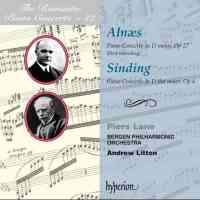 Alnaes & Sinding Piano concertos Alnaes & Sinding Piano concertos
Bergen PO/Litton
Piers Lane (piano)
Hyperion CDA67555
There are two sides to every coin, so you may think this is yet another admirable issue in Hyperion's romantic piano concerto series, yet another blow towards defeating the tyranny of the familiar. This is No 42 in the series, so each must be at least the eightieth work Hyperion has revived; both composers and the orchestra are Norwegian.
Or, you may think that the pitifully small number of oft-performed romantic piano concertos (perhaps only about a dozen) is a sign they are difficult to write and easy to get wrong. So the famous examples, although over-exposed, are nevertheless the best.
To me, these are not works that challenge the orthodoxy; they are rather fish out of water – Alnaes was above all an organist; like Sinding he was from necessity a composer of songs and short piano works. Fair enough if their ambitions extended beyond practicalities, and musicologically interesting to hear echoes of Grieg, Liszt and Brahms in these works. But I do not personally hear clarity of structure and a satisfying balance between rhetoric and motivic development in them.
If one is to revive works like these, it is obviously better to do so properly, as Hyperion have done. Piers Lane plays with technical facility and crystalline tone, the orchestra with sensitivity and enthusiasm.
As the notes remark, Alnaes' style is more Rachmaninov than Grieg, although the chordal writing and scale passages are reminiscent of the latter. Sinding's large-scale work is nowhere near as fluent as his miniatures.
As the European Union advances, we often hear a new discussion in Europe 's cultural sector – local or international? In literature or film, this is of course of especial salience because of the increasing dominance of the English language – that is one reason the argument is less apparent in Britain, where the big question is ‘Europe or America?'.
The Scandinavians, small countries that have always had a high level of English proficiency, are at the forefront of the linguistic argument. Although the situation is very different in classical music, there is something of an irony that just as Nationalism gave a second life to the Romantic style, so localism gives added impetus to this kind of ‘romantic revival.'
So a patriotic Norwegian may feel differently about this disc, but despite the expectedly high production values, I doubt that these works will find themselves in the canon in years to come, and my interest in this CD is more musicological than emotional.
Ying Chang
|



